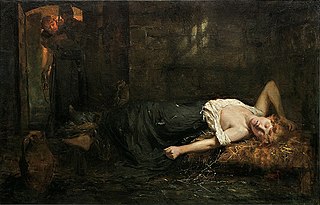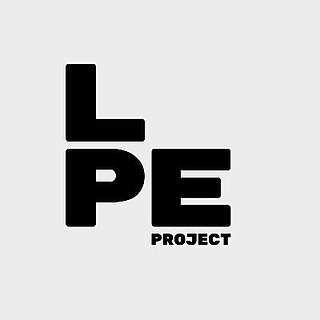Related Research Articles
Post-structuralism is a term for philosophical and literary forms of theory that both build upon and reject ideas established by structuralism, the intellectual project that preceded it. Though post-structuralists all present different critiques of structuralism, common themes among them include the rejection of the self-sufficiency of structuralism, as well as an interrogation of the binary oppositions that constitute its structures. Accordingly, post-structuralism discards the idea of interpreting media within pre-established, socially constructed structures.

The Frankfurt School is a school of social theory and critical philosophy associated with the Institute for Social Research, at Goethe University Frankfurt in 1929. Founded in the Weimar Republic (1918–1933), during the European interwar period (1918–1939), the Frankfurt School initially comprised intellectuals, academics, and political dissidents dissatisfied with the contemporary socio-economic systems of the 1930s. The Frankfurt theorists proposed that social theory was inadequate for explaining the turbulent political factionalism and reactionary politics occurring in 20th century liberal capitalist societies. Critical of both capitalism and of Marxism–Leninism as philosophically inflexible systems of social organization, the School's critical theory research indicated alternative paths to realizing the social development of a society and a nation.
The indeterminacy debate in legal theory can be summed up as follows: Can the law constrain the results reached by adjudicators in legal disputes? Some members of the critical legal studies movement — primarily legal academics in the United States — argued that the answer to this question is "no." Another way to state this position is to suggest that disputes cannot be resolved with clear answers, and thus there is at least some amount of uncertainty in legal reasoning and its application to disputes. A given body of legal doctrine is said to be "indeterminate" by demonstrating that every legal rule in that body of legal doctrine is opposed by a counterrule that can be used in a process of legal reasoning.
Critical legal studies (CLS) is a school of critical theory that developed in the United States during the 1970s. CLS adherents claim that laws are devised to maintain the status quo of society and thereby codify its biases against marginalized groups.
Law and economics, or economic analysis of law, is the application of microeconomic theory to the analysis of law, which emerged primarily from scholars of the Chicago school of economics. Economic concepts are used to explain the effects of laws, to assess which legal rules are economically efficient, and to predict which legal rules will be promulgated. There are two major branches of law and economics; one based on the application of the methods and theories of neoclassical economics to the positive and normative analysis of the law, and a second branch which focuses on an institutional analysis of law and legal institutions, with a broader focus on economic, political, and social outcomes, and overlapping with analysis of the institutions of politics and governance.

Early modern philosophy is a period in the history of philosophy at the beginning or overlapping with the period known as modern philosophy.
Feminist legal theory, also known as feminist jurisprudence, is based on the belief that the law has been fundamental in women's historical subordination. Feminist jurisprudence the philosophy of law is based on the political, economic, and social inequality of the sexes and feminist legal theory is the encompassment of law and theory connected.The project of feminist legal theory is twofold. First, feminist jurisprudence seeks to explain ways in which the law played a role in women's former subordinate status. Feminist legal theory was directly created to recognize and combat the legal system built primarily by the and for male intentions, often forgetting important components and experiences women and marginalized communities face. The law perpetuates a male valued system at the expense of female values. Through making sure all people have access to participate in legal systems as professionals to combating cases in constitutional and discriminatory law, feminist legal theory is utilized for it all.

Roberto Mangabeira Unger is a Brazilian philosopher and politician. His work is in the tradition of classical social theory and pragmatism, and is developed across many fields including legal theory, philosophy and religion, social and political theory, progressive alternatives, and economics. In natural philosophy he is known for The Singular Universe and the Reality of Time. In social theory he is known for Politics: A Work in Constructive Social Theory. In legal theory he was part of the Critical Legal Studies movement, which helped disrupt the methodological consensus in American law schools. His political activity helped the transition to democracy in Brazil in the aftermath of the military regime, and culminated with his appointment as Brazil's Minister of Strategic Affairs in 2007 and again in 2015. His work is seen to offer a vision of humanity and a program to empower individuals and change institutions.
Critical management studies (CMS) is a loose but extensive grouping of theoretically informed critiques of management, business and organisation, grounded originally in a critical theory perspective. Today it encompasses a wide range of perspectives that are critical of traditional theories of management and the business schools that generate these theories.

Critical race theory (CRT) is a cross-disciplinary examination, by social and civil-rights scholars and activists, to explore how laws, social and political movements, and media shape, and are shaped by, social conceptions of race and ethnicity. Goals include challenging all mainstream and "alternative" views of racism and racial justice, including conservative, liberal and progressive. The word critical in the name is an academic reference to critical thinking, critical theory, and scholarly criticism, rather than criticizing or blaming people.

Afrocentricity is an academic theory and approach to scholarship that seeks to center the experiences and peoples of Africa and the African diaspora within their own historical, cultural, and sociological contexts. First developed as a systematized methodology by Molefi Kete Asante in 1980, he drew inspiration from a number of African and African diaspora intellectuals including Cheikh Anta Diop, George James, Harold Cruse, Ida B. Wells, Langston Hughes, Malcolm X, Marcus Garvey, and W. E. B. Du Bois. The Temple Circle, also known as the Temple School of Thought, Temple Circle of Afrocentricity, or Temple School of Afrocentricity, was an early group of Africologists during the late 1980s and early 1990s that helped to further develop Afrocentricity, which is based on concepts of agency, centeredness, location, and orientation.

The sociology of law is often described as a sub-discipline of sociology or an interdisciplinary approach within legal studies. Some see sociology of law as belonging "necessarily" to the field of sociology, but others tend to consider it a field of research caught up between the disciplines of law and sociology. Still others regard it as neither a subdiscipline of sociology nor a branch of legal studies but as a field of research on its own right within the broader social science tradition. Accordingly, it may be described without reference to mainstream sociology as "the systematic, theoretically grounded, empirical study of law as a set of social practices or as an aspect or field of social experience". It has been seen as treating law and justice as fundamental institutions of the basic structure of society mediating "between political and economic interests, between culture and the normative order of society, establishing and maintaining interdependence, and constituting themselves as sources of consensus, coercion and social control".
Ethics: An International Journal of Social, Political, and Legal Philosophy is a peer-reviewed academic journal established in 1890 as the International Journal of Ethics, renamed in 1938, and published since 1923 by the University of Chicago Press. The journal covers scholarly work in moral, political, and legal philosophy from a variety of intellectual perspectives, including social and political theory, law, and economics. It publishes both theory and application of theory to contemporary moral issues, as well as historical essays, provided they have significant implications for contemporary theory. The journal also publishes review essays, discussion articles, and book reviews. The journal employs a double-blind peer review process.
Costas Douzinas is a professor of law, a founder of the Birkbeck School of Law and the Department of Law of the University of Cyprus, the founding director of the Birkbeck Institute for the Humanities at Birkbeck, University of London, the President of the Nikos Poulantzas Institute and a former politician.
Articles in social and political philosophy include:
This is an index of articles in jurisprudence.

The paradox of nihilism is a family of paradoxes regarding the philosophical implications of nihilism, particularly situations contesting nihilist perspectives on the nature and extent of subjectivity within a nihilist framework. There are a number of variations of this paradox.
Feminist political theory is an area of philosophy that focuses on understanding and critiquing the way political philosophy is usually construed and on articulating how political theory might be reconstructed in a way that advances feminist concerns. Feminist political theory combines aspects of both feminist theory and political theory in order to take a feminist approach to traditional questions within political philosophy.

A critical theory is any approach to social philosophy that focuses on reflective assessment and critique of society and culture to reveal and challenge power structures. With roots in sociology and literary criticism, it argues that social problems stem more from social structures and cultural assumptions than from individuals. It argues that ideology is the principal obstacle to human liberation. Critical theory finds applications in various fields of study, including psychology, sociology, history, communication theory, philosophy and feminist theory.

The Law and Political Economy (LPE) Project is a collaborative project that examines the relationship between the law and capitalism. In addition to a blog, the Project regularly hosts speaking events, debates, and lectures. It also circulates printed materials, hosts a summer academy and runs mentoring programs.
References
- ↑ Hunt, Alan (1987). "The Critique of Law: What is 'Critical' about Critical Legal Theory?". Journal of Law and Society. 14 (1): 5–19. JSTOR 1410293.
- ↑ Sharyn L. Roach Anleu, Law and Social Change, 63, Sage Publications inc. (2009)
- 1 2 3 Douzinas, Costas. "Oubliez Critique" (PDF). Archived from the original (PDF) on 2012-03-21. Originally published in Douzinas, Costas (2005). "Oubliez Critique". Law and Critique. 16: 47–69. doi:10.1007/s10978-005-4907-8.
- ↑ Neil J. Smelser, Paul B. Baltes, International Encyclopedia of the Social & Behavioral Sciences, 2971, Pergamon (22 Nov 2001)
- ↑ Rose, Nikolas (1987). "Beyond the Public/Private Division: Law, Power and the Family". Journal of Law and Society. 14 (1): 61–76. JSTOR 1410297.
- ↑ J. Stuart Russell, The Critical Legal Studies Challenge to Contemporary Mainstream Legal Philosophy, 18 Ottawa L. Rev. 1 (1986)